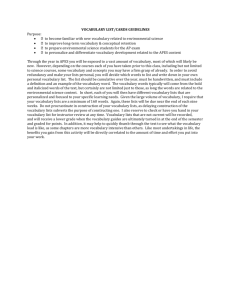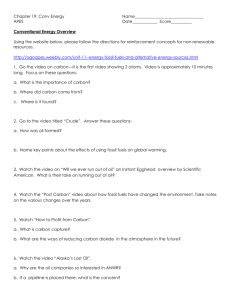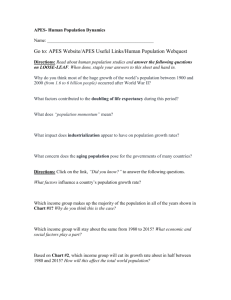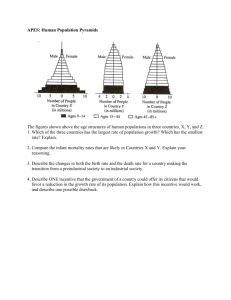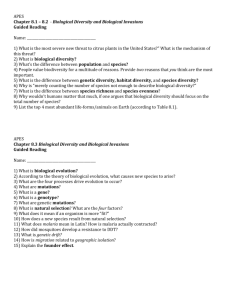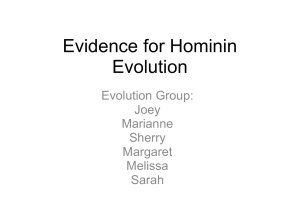AP ENVIRONMENTAL SCIENCE
advertisement
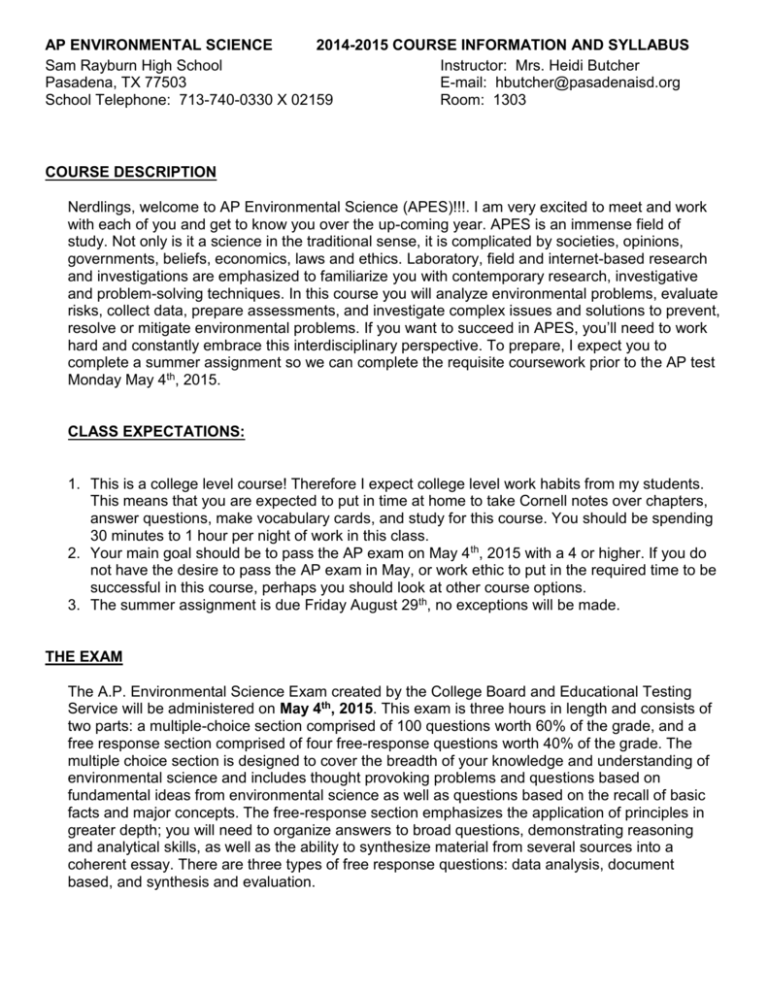
AP ENVIRONMENTAL SCIENCE 2014-2015 COURSE INFORMATION AND SYLLABUS Sam Rayburn High School Instructor: Mrs. Heidi Butcher Pasadena, TX 77503 E-mail: hbutcher@pasadenaisd.org School Telephone: 713-740-0330 X 02159 Room: 1303 COURSE DESCRIPTION Nerdlings, welcome to AP Environmental Science (APES)!!!. I am very excited to meet and work with each of you and get to know you over the up-coming year. APES is an immense field of study. Not only is it a science in the traditional sense, it is complicated by societies, opinions, governments, beliefs, economics, laws and ethics. Laboratory, field and internet-based research and investigations are emphasized to familiarize you with contemporary research, investigative and problem-solving techniques. In this course you will analyze environmental problems, evaluate risks, collect data, prepare assessments, and investigate complex issues and solutions to prevent, resolve or mitigate environmental problems. If you want to succeed in APES, you’ll need to work hard and constantly embrace this interdisciplinary perspective. To prepare, I expect you to complete a summer assignment so we can complete the requisite coursework prior to the AP test Monday May 4th, 2015. CLASS EXPECTATIONS: 1. This is a college level course! Therefore I expect college level work habits from my students. This means that you are expected to put in time at home to take Cornell notes over chapters, answer questions, make vocabulary cards, and study for this course. You should be spending 30 minutes to 1 hour per night of work in this class. 2. Your main goal should be to pass the AP exam on May 4th, 2015 with a 4 or higher. If you do not have the desire to pass the AP exam in May, or work ethic to put in the required time to be successful in this course, perhaps you should look at other course options. 3. The summer assignment is due Friday August 29th, no exceptions will be made. THE EXAM The A.P. Environmental Science Exam created by the College Board and Educational Testing Service will be administered on May 4th, 2015. This exam is three hours in length and consists of two parts: a multiple-choice section comprised of 100 questions worth 60% of the grade, and a free response section comprised of four free-response questions worth 40% of the grade. The multiple choice section is designed to cover the breadth of your knowledge and understanding of environmental science and includes thought provoking problems and questions based on fundamental ideas from environmental science as well as questions based on the recall of basic facts and major concepts. The free-response section emphasizes the application of principles in greater depth; you will need to organize answers to broad questions, demonstrating reasoning and analytical skills, as well as the ability to synthesize material from several sources into a coherent essay. There are three types of free response questions: data analysis, document based, and synthesis and evaluation. All students will take the APES exam on May 4th, 2015 for college credit, and all students are expected to pass the exam. Each student will need to pay $25 for the exam and fees will be collected in early March. There will be 3 mandatory review sessions for APES students. There will also be two mandatory mock exams: Saturday March 14th, and Saturday April 18th. The dates for the review sessions are below. Please put these and the two mock exam dates in your Phone calendars, let your parents, JROTC instructors, Band instructors, choir instructors, orchestra directors, and coaches know that these dates are set in stone and are MANDATORY for the college course you will be taking. MANDATORY REVIEW SESSIONS: 1.) Saturday January 10th 2015 2.) Saturday March 28th 2015 3.) Saturday April 25th 2015 COURSE MATERIALS - Miller, Living in the Environment (AP 16th Edition), Brooks/Cole 2011 Supplies: - 2 composition notebooks (one for Cornell notes and lectures, the second for lab data) 2 rolls of paper towels pen and/or pencil various supplies needed throughout the year to conduct laboratory investigations ATTENDANCE AND PARTICIPATION You are expected to attend and participate in all class sessions and assignments. You should complete assigned reading and exercises before the date they are due, and you are expected to participate fully in labs, fieldwork, and other exercises, whether they be individual or team-based. See student handbook for school attendance policy. CLASS RULES This course is equivalent to a college level course, and you are expected to act as an adult at all times, whether in class, in the lab, or on a field trip. Disruption of class activities in any way will not be tolerated. CLASS ASSIGNMENTS: Class assignments will include homework assignments, team projects and research, reading and written work, multiple choice assessments, essay assessments, and laboratory work. Scientists and environmental professionals are expected to present their work products in a timely, neat, accurate and well-organized fashion, and you are expected to do the same in this course. Work must be submitted on the day it is due, or you will receive a zero. LABORATORIES: Laboratory and field investigations are designed to complement the lecture portion of the course by providing opportunities to learn about the environment through firsthand observations, to test concepts and principles which have been introduced in class, to explore specific issues and problems in greater depth, and to gain an awareness of the importance of confounding variables which exist in the real world. Investigations will be diverse and will include indoor laboratory activities, outdoor activities, as well as field experience outside the confines of the campus. The labs are designed to invite students to think critically, to observe environmental systems, to develop and conduct well designed experiments, to utilize appropriate techniques and instrumentation, to analyze and interpret data, to present data orally and in the form of statistical and graphical presentations, to apply concepts to the solution of environmental problems, to form conclusions and to propose further study. All activities will be written in the lab composition book and must follow the lab report guidelines EXAMS & GRADING Students will be evaluated through performance on unit exams, quizzes on the reading assigned as homework, laboratory investigations and lab reports, the APES notebook, current events, group projects, and writing assignments. Grade Components: 50 % Unit Tests 30 % Laboratories, projects 20% Daily work, homework Grading Scale: A 90 – 100 % B 80 – 89 % C 70 – 79 % D 60 – 69 % F below 59 % WHAT IS COVERED IN THIS COURSE The following is a break-down of the amount of time we will spend on each topic in AP Environmental Science. Topic Terrestrial Ecology 3 weeks Population dynamics Communities and niches Terrestrial biomes Energy flow and pyramids Biogeochemical cycles Energy concepts Biomagnification Third Rock from the Sun Geologic time scale Plate tectonics Duration 2 weeks Earthquakes & volcanoes Rock cycle Aquatic Ecology 2 weeks Eutrophication Freshwater biomes Surface and groundwater issues Conservation Human Populations Biodiversity 2 weeks Species diversity Preservation, remediation, mitigation, restoration Habitat loss Exotic species Endangered and extinct species Deforestation Economic impacts and decisions Public and federal lands Relevant laws Nonrenewable Resources and Energy 4 weeks Human population sizes & distribution Distribution and fertility rates Growth rate and doubling times Demographic transitions Age structure diagrams Global Economics Urban development and transportation Energy forms, units and conversions History and global energy use Mining Fossil fuel resources and use Nuclear energy Renewable energy Energy conservation Economic impacts and decisions 3 weeks Soil 2 weeks Formation and composition Physical and chemical properties Soil types Erosion and other soil problems Conservation Forestry, agriculture and Rangeland Water Pollution Sources, causes and effects Surface and groundwater issues Cultural Eutrophication Water purification Sewage treatment Human health risks Clean Water Act and other laws Air pollution Smog Acid deposition Indoor air pollutants Clean Air Act and other laws Human health risks Stratospheric ozone and ozone depletion Global warming Economic impacts Air 2 weeks 2 ½ weeks Pesticides Types of pesticides Cost and benefits of pesticide use Hazards to human health Hazardous chemicals Integrated Pest Management Relevant Laws Meteorology 2 weeks Saltwater Ocean circulation Global problems Fishing techniques Overfishing Relevant laws and treaties Waste Management 2 weeks Seasons Solar intensity and latitude ENSO Weather and climate Atmospheric circulation and the Coriolis Effect Marine Ecology 2 ½ weeks 2 weeks Solid waste disposal and reduction Hazard chemicals and wastes ARE THERE ANY OTHER WEBSITES I SHOULD JOIN OR SOCIAL MEDIA AFFILIATED WITH YOU OR YOUR COURSE? 1.) Yes! As I am the educator accepted onto a research team in New Zealand this summer where I will be tagging Dusky Dolphins. I was asked to create a twitter and Instagram. I also have a class facebook page and a youtube station. 2.) My Twitter is: @Queen_Nerdling 3.) My Youtube channel is: queen nerdling You can find my channel by typing in “Queen Nerdling” in the search field or by following this link: https://www.youtube.com/channel/UCO7OfGz2T5UNcAbIFiBDD_g . This is where all my video lectures are posted and where I will be posting my video blogs documenting my experience in New Zealand. 4.) Student facebook page is: https://www.facebook.com/pages/Sam-Rayburn-High-School-MrsButchers-Pre-AP-Biology-Class/206787726078843 My facebook page is where I post photos of labs and activities that you, the students, do throughout the year . STUDENT PARENT AGREEMENT FORM: NAME:_________________________ Please read over the syllabus and course information. Turn this form in to Mrs. Butcher signed by yourself and your legal guardian I understand that I have decided to take a college course titled AP Environmental Science (APES). I understand that this course is taught at a 4 year university college level and will require 3-7 hours a week of my time put in at home. I understand that I must purchase my own book for this course. I also understand that I will be held responsible for turning all assignments in on time, doing test corrections when I receive my tests back, and that I must attend all review session dates listed below. Review sessions are mandatory. I understand that I am required to attend these sessions and need to schedule other activities around them. I understand that I am required to pay for and take the APES exam on May 4th 2015. I understand failure to complete any of these requirements may result in failing the course. By signing below I agree to do all my work, spend the appropriate amount of time studying for this course, take the AP exam, and attend mandatory review sessions. 1.) Saturday January 10th 2015 2.) Saturday March 28th 2015 3.) Saturday April 25th 2015 Student Signature:________________________________________________ I understand that my son/daughter has chosen to take a college level course titled AP Environmental Science (APES). I understand my son/daughter must put in extensive time at home as this course is taught at a 4 year university level. I understand that my son/daughter is responsible for purchasing their own book for this college level course. I understand that my son/daughter is required to attend the 3 mandatory review session dates listed on this form and must pay for and take the APES exam on May 4th. I agree to all of these terms and will support my son/daughter and will help monitor them at home to ensure they are completing assignments and putting in adequate time studying for this course. Parent Signature:_________________________________________________
